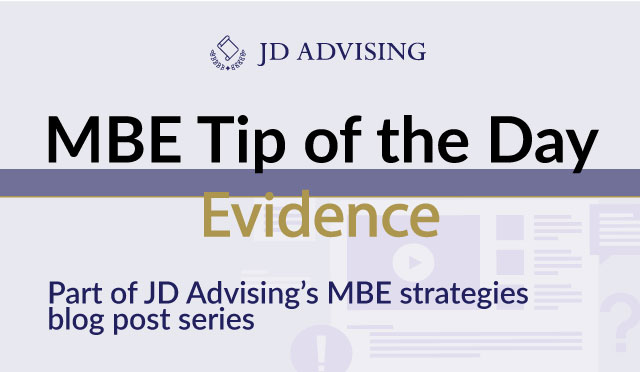MBE Strategies Tip #8—Evidence
MBE Strategies Blog Post Series
Welcome to our MBE tips and tricks blog post series! In this post, we cover an Evidence MBE question together. Evidence is a tricky subject for a lot of students so it is important to master Evidence MBE questions — especially on those that cover hearsay.
You will see 25 Evidence MBE questions on the Multistate Bar Exam. 6-7 of those questions will cover hearsay. (The question we review in this post has a hearsay issue in it too!) We will be posting a Multistate Bar Exam question once every couple days along with an answer. Each post will cover one highly-tested area of substantive law as well as an important MBE strategy. Today, we will review an Evidence MBE question that covers a hearsay issue as well as another tricky point of Evidence law.
Do your best to answer this question (before even looking at the answer choices and before looking at the answer below!) Ask yourself: What is the subject? What is the legal issue? What is the rule and analysis? What is the conclusion? Try to answer these beginning questions before even reading the answer choices.
Then, you can uncover the Evidence MBE answer as well as read more about our MBE strategy of the day.
Show Evidence Question
Evidence MBE Question:
In a civil action for conversion of her automobile, a plaintiff seeks to offer testimony that after her automobile went missing, the defendant approached the plaintiff at her place of business and said, “I just stole your car. How does it feel to be stranded?” The business had security cameras that recorded the entire conversation. The defendant objects to the plaintiff’s testimony regarding his statement.
Is the plaintiff’s testimony regarding the defendant’s statement admissible?
(A) Yes, as a declaration against interest.
(B) Yes, because it is not hearsay.
(C) No, because the tape recording is the best evidence.
(D) No, because it is hearsay not within any exception.
Subject:
Legal Issue:
Legal Rule and Analysis: (If you need to look at your outline to find the legal rule, feel free to use it when you have not yet memorized the subject. Using your outline will help you actively learn and memorize your outline!)
Conclusion:
Look at the answer choices provided. Choose an answer choice that matches your conclusion. Review the other answer choices provided.
Show Answer to Evidence MBE Question
Answer to Evidence MBE Question:
Common mistake: Students forget the “easy answer” − party admission! Some students fall into “MBE Traps” with the Best Evidence Rule or other Evidentiary Rules.
Subject: Evidence
Legal Issue: Can the defendant’s statement be offered into evidence or does the defendant have a valid objection? Specifically, is the statement hearsay not within any exception or is there some other evidentiary rule that prevents the statement from coming in? Does the fact that it was recorded prevent the plaintiff from testifying regarding what he heard?
Legal Rule and Analysis: A statement is not hearsay if it is a statement made by the party-opponent (“party admission.”) Because this statement was made by a party-opponent, it is not precluded from being admitted into evidence based on hearsay grounds.
Hearsay:
Students tend to make the statement by party opponent hearsay exclusion much harder than it is. The general rule is: If a party says it, it can be admitted against them! It is actually considered “nonhearsay” rather than a hearsay exception. (Note: It does not matter if the party whom the statement is being used against denies making it or says they were joking or that the other party took it out of context – because they are a party to the case so they can simply deny or explain the statement at trial.)
If you are getting mixed up with party admission and statement against interest, remember that to admit a statement as a statement against interest, the declarant has to be unavailable. For a party admission, availability does not matter. (Further, for a party admission, the statement does not have to be against their interest at the time they make it.) So focus on whether a party says something, if so, and if it is being used against them (then we know the answer is “statement by party opponent”). Don’t make things harder on yourself by looking at hearsay exceptions like statement against interest!
Best Evidence:
As for the recording: The best evidence rule can keep a statement from being used if the original of the statement is not being offered and the statement either (1) has legal significance (e.g., is in a will, contract, etc.) or (2) the witness is testifying to an event she learned solely from reading a writing or watching a video and has no independent knowledge of that event.
In this case, there is no record of legal significance, so it doesn’t fall into category (1). Further, the plaintiff had personal knowledge of the statement and it is not a legal document. So the Best Evidence Rule will not preclude its admission under category (2).
Conclusion:In this case, the defendant made the statement. Thus, it can come in as an admission by a party-opponent. Further, he best evidence rule will not preclude its admission.
Choose an answer choice that most closely matches your conclusion and explain why the others are incorrect: (B) is the best answer because it recognizes this exclusion. (A) is incorrect because in order for one to have a statement against interest admitted, the witness needs to be unavailable. In this case, the defendant is available. (Further, there is no reason to look for a hearsay exception when the statement, as a party-opponent, is not even hearsay to begin with.) (C) is incorrect for the reasons mentioned above. (D) is incorrect because the statement is an admission by party opponent.
MBE Tip: While it is best to focus on the most highly-tested areas of law, do not ignore the difficult areas of law that are not usually the right answer (the best evidence rule in Evidence, the privileges and immunities clause of the 14th Amendment, the necessary and proper “power”, ex post facto laws, etc.) – especially if you tend to “second guess” yourself. This is especially the case if it doesn’t take you too long to understand these nuances. You can confidently cross off incorrect answers and you won’t fall into classic MBE traps.
Show Summary of Two Key Takeaway Points
Key Takeaways for the day:
Takeaway for the Law: For Party Admission: The general rule for a party admission is: if a party says it, it can be admitted against them! (It does not matter if the party whom the statement is being used against denies making it or says they were joking or that the other party took it out of context – because they are a party to the case so they can simply deny or explain the statement at trial!)
The best evidence rule is that one can keep a statement from being used if the original of the statement is not being offered and the statement either (1) has legal significance (e.g., is in a will, contract, etc.) or (2) the witness is testifying to an event she learned solely from reading a writing or watching a video and has no independent knowledge of that event.
MBE Tip: While it is best to focus on the most highly-tested areas of law, do not ignore the difficult areas of law that are not usually the right answer (the best evidence rule in Evidence, the privileges and immunities clause of the 14th Amendment, the necessary and proper “power”, ex post facto laws, etc.) – especially if you tend to “second guess” yourself. This is especially the case if it doesn’t take you too long to understand these nuances. You can confidently cross off incorrect answers and you won’t fall into classic MBE traps.
If you would like to see “MBE tip of the day” posts from prior days, please click on the links below:
Show MBE tip posts from past days
- MBE Strategies: Day 1 – Torts (negligence)–and how to approach MBE questions.
- MBE Strategies: Day 2 – Criminal Law (homicide) — and learning through “wrong” answers.
- MBE Strategies: Day 3 — Evidence (hearsay) –and memorizing the details!
- MBE Strategies: Day 4 – Contracts and Sales – and spending time on the subjects that are difficult for you.
- MBE Strategies: Day 5 – Real Property (future interests) – and spending time on the highly-tested areas of law.
- MBE Strategies: Day 6 – Civil Procedure (summary judgment) – and eliminating incorrect answers.
- MBE Strategies: Day 7: Constitutional Law (political question, standing) – and how to answer a question correctly when you are in between two choices.
- MBE Strategies: Day 8: Evidence (hearsay, best evidence rule) – and why it is good to fine-tune your knowledge of the “red herring” areas of the law.
- MBE Strategies: Day 9: Torts (conversion) – and where to get actual released MBE questions!
- MBE Strategies: Day 10: Criminal Procedure (5th Amendment) – and how to pick between two answer choices.
- MBE Strategies: Day 11: Contracts (contract formation) – and what to do if you “overthink” questions.
- MBE Strategies: Day 12: Real Property (deed delivery) – and jotting out the fact pattern.
- MBE Strategies: Day 13: Civil Procedure (jurisdiction) – and “bringing it all together”.
- MBE Strategies: Day 14: Constitutional Law (taxing and spending) – and why to answer more Constitutional Law and Civil Procedure questions.
- MBE Strategies: Day 15: Constitutional Law (powers of congress) – and how to get better at Constitutional law questions.
- MBE Strategies: Day 16: Criminal Procedure (exclusionary rule) – and paying attention to the call of the question.
- MBE Strategies: Day 17: Evidence (character evidence) – and how to tell a civil case from a criminal case (and why it matters!).
- MBE Strategies: Day 18: Real Property (joint tenancy) – and how to get more Real Property questions right!
- MBE Strategies: Day 19: Civil Procedure (JAAMOL) – and how to learn Civil Procedure.
- MBE Strategies: Day 20: Torts (joint and several liability) – and tips on MBE default rules.
- MBE Strategies: Day 21: Evidence (hearsay) – and the importance of memorizing the law!
- MBE Strategies: Day 22: Contracts (formation) – and why you should not ignore the written portion of the bar exam!
- MBE Strategies: Day 23: Criminal Law and Procedure (and the importance of mens rea).
- MBE Strategies: Day 24: Constitutional Law (equal protection) – and the importance of writing incorrect answers down!
- MBE Strategies: Day 25: Civil Procedure (impleader) – and free released NCBE questions!
- MBE Strategies: Day 26: Real Property (future interests) – and learning the highly tested MBE topics.
- MBE Strategies: Day 27: Torts (intentional torts) – and the importance of learning rule statements.
- MBE Strategies: Day 28: Evidence (impeachment) – and how to keep impeachment, character evidence, etc. straight!
- MBE Strategies: Day 29: Criminal Procedure (line-ups) – and how charts can help you keep the 5th, 6th, and 14th Amendment straight!
- MBE Strategies: Day 30: Contracts (revocation of acceptance of goods) – and how finding patterns in your answer sheet can improve your score.
- MBE Strategies: Day 31: Constitutional Law (public v. private forum) – and last-minute MBE tips.
- MBE Strategies: Day 32: Torts (premises liability) – and eliminating incorrect statements of law.
- MBE Strategies: Day 33: Criminal Law (robbery) – and knowing your state vs. MBE distinctions.
- MBE Strategies: Day 34: Real Property (priority and recording acts) – and writing answers to the questions.
- MBE Strategies: Day 35: Torts (comparative negligence, joint and several liability) – and learning the theories behind the laws.
- MBE Strategies: Day 36: Contracts and Sales (recovering the purchase price) – and creating a timeline of events when answering MBE questions.
- MBE Strategies: Day 37: Constitutional Law (1st Amendment) – and making a diagram as you study.
- MBE Strategies: Day 38: Evidence (extrinsic evidence) – and learning the definitions of basic legal terms.
- MBE Strategies: Day 39: Civil Procedure (motion to dismiss) – and creating a timeline of the judicial process while studying.
- MBE Strategies: Day 40: Real Property (present and future interests) – and the importance of grammar.
- MBE Strategies: Day 41: Torts (battery) – and paying close attention to the call of the question.
- MBE Strategies: Day 42: Criminal Procedure (4th Amendment) – and why you shouldn’t skip straight to the narrow rules.
- MBE Strategies: Day 43: Criminal Law (burglary) – and why you need to know the elements of crimes!
- MBE Strategies: Day 44: Contracts and Sales (damages) – and answering the question in your head first.
- MBE Strategies: Day 45: Constitutional Law (interstate commerce and equal protection) – and paying attention to which entity is attempting to act.
- MBE Strategies: Day 46: Evidence (impeachment) — and how to identify the applicable evidentiary rule.
- MBE Strategies: Day 47: Civil Procedure (full faith and credit clause and preclusion) – and newly released NCBE civil procedure questions.
- MBE Strategies: Day 48: Civil Procedure (removal) – and understanding the policies behind the rules.
- MBE Strategies: Day 49: Real Property (eviction) – and the importance of paying attention to details!
- MBE Strategies: Day 50: Torts (trespass) – and the importance of memorizing the elements and categories of torts.
- MBE Strategies: Day 51: Evidence (lay witness testimony) – and avoiding distractions.
- MBE Strategies: Day 52: Civil Procedure (automatic disclosures) – and eliminating answer choices.
- MBE Strategies: Day 53: Torts (duty of a premises possessor) – and to not feel too sorry for vulnerable plaintiffs!
- MBE Strategies: Day 54: Real Property (equitable servitudes) – and finding differences in concepts.
- MBE Strategies: Day 55: Civil Procedure a bonus FIVE MBE tips!
- MBE Strategies Day 56: Constitutional Law (equal protection) – and memorizing the standards of review.
- MBE Strategies Day 57: Contracts (installment contracts) – and learning the nuances of the law.
- MBE Strategies Day 58: Criminal Procedure (5th Amendment) – and understanding the scope of constitutional rights.
- MBE Strategies Day 59: Civil Procedure (exception to final judgment rule) – and understanding the rules and their exceptions.
- MBE Strategies Day 60: Evidence (which law applies to privileges in federal court) – and the importance of knowing the law.
Seeking MBE Assistance?
Seeking MBE Assistance?
- 📘 MBE Guide: Equip yourself with our FREE expert-crafted bar exam and MBE guides.
- Free Bar Exam Resource Center: Discover top resources, articles, and free webinars led by renowned bar exam professionals.
Top Resources as Vouched by our Students:
- MBE One-Sheets: One of our most highly acclaimed bar exam supplements!
- Bar Exam Outlines: Our comprehensive and condensed bar exam outlines present key information in an organized, easy-to-digest layout.
- MBE Private Tutoring: Opt for personalized, effective strategies.
- On Demand Bar Exam Course: Comprehensive bar exam preparation.
- Bar Exam Crash Course and Mini Outlines: Acclaimed and effective for a quick refresher.
- MBE Mastery Class, Real MBE Questions, and MBE Guide: Elevate your MBE preparation with these high-quality MBE supplements!
🔥 NEW! Check out our Repeat Taker Bar Exam Course and get introduced to our unmatched platinum Guarantee Pass Program.







Comments are closed.